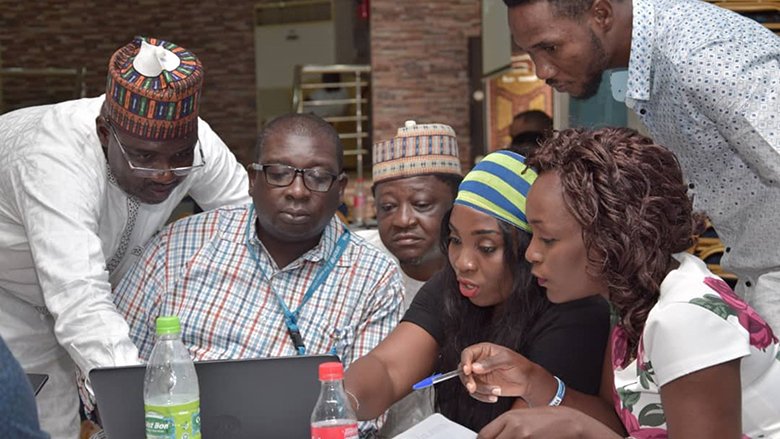“During the implementation of the Somalia Urban Resilience Project, we noticed that the participation of women and internally-displaced persons (IDPs) in jobs created by civil works was low. We decided to conduct an assessment on the issue using GEMS. The results and recommendations of the assessments were shared with the World Bank and used to maximize women's and IDPs' access to job opportunities.“
Mohamed Mohamoud Yusuf,
Monitoring and Evaluation Specialist, Somalia Urban Resilience Project II
Challenge
Quality data collection for project monitoring and supervision is often very challenging in remote and insecure FCV settings. The COVID-19 pandemic also made reaching project areas more complicated. Without reliable information, it is hard to evaluate progress on the ground. Lack of access also limits face-to-face engagement with beneficiaries. The combination of these factors leaves local leaders, public officials, and international partners without timely information on project progress and outcomes. Given these constraints, it is important to find new ways to collect real-time field insights and enable reporting from remote project areas.
Approach
GEMS has responded to this challenge by building local capacity among project teams, clients, and partners, training them to collect and analyze field data using free, simple, and open-source software. This has allowed partners and project teams to monitor project activities in real time, especially in remote areas. Teams learned how to run customized digital monitoring platforms based on their specific needs, using free open-source tools such as KoBoToolbox. Project teams also learned how to geotag data that could be automatically uploaded to interactive databases, and maps with photos and indicators from the field. These simple data collection methods have made remote project supervision possible, providing teams with a more effective way to monitor and manage their projects.
Results
By the end of 2022, GEMS had been implemented with 1,000 projects across more than 100 countries worldwide.
Over 150,000 sub-projects and activities were mapped and the Information and Communications Technology (ICT) capacity of more than 7,500 government staff and partners was strengthened. Examples included:
- Central African Republic: The Health System Support and Strengthening Project mapped gender-based violence (GBV) service providers, tracked the delivery and supply of medication to 300 health facilities in 15 districts, and monitored cash handovers for performance-based payments to over 350 health facilities.
- Democratic Republic of Congo (DRC): In response to the 2018-2020 Kivu Ebola crisis, GEMS supported the World Bank Ebola Crisis Response and Recovery efforts with the development of a fully customized digital monitoring platform. This allowed teams to deploy rapid digital surveys to identify the most vulnerable beneficiaries and monitor work sites in real time for better course correction. In a few months, more than 111,000 surveys were administered and 14 million data points were collected, supporting over 100,000 beneficiaries.
- Bangladesh: The Livestock and Dairy Development Project’s Contingency Emergency Response Component compensated livestock farmers’ economic losses due to COVID-19. The project supported 620,000 livestock farmers throughout the country and collected detailed and gender-disaggregated data on over 70,000 beneficiaries, demonstrating the benefits of GEMS beyond FCV situations.
- Azerbaijan: The Rural Investment Project (AzRIP) trained 40 Project Implementation Unit (PIU) members; mapped over 2,000 community project sites throughout the country within 10 days; and made all data available to the public on a user-friendly interactive web map that is searchable by location, year of construction, and infrastructure type and provides details on each project investment.
Bank Group Contribution
The Korean Trust Fund for Economic and Peace-Building Transitions (KTF), administered by the World Bank, has contributed approximately $1.5 million. The World Bank Group (WBG) Partnership Fund for the Sustainable Development Goals (SDGs) has contributed $500,000. Between July 1, 2021 and June 30, 2022, various Country Management Units (CMUs) allocated $1.5 million.
Partners
The United Nations High Commissioner for Refugees (UNHCR) and the Harvard Humanitarian Initiative are collaborating on the open-source data platform, KoBoToolbox. The European Space Agency (ESA) focuses on building capacity in Earth observation through satellite imagery. The Global Evaluation Initiative (GEI) offers capacity building to developing countries to strengthen monitoring systems. The African Development Bank (AfDB) began in 2021 to roll out GEMS across Africa.
Looking Ahead
Looking ahead, GEMS will continue its engagement in sub-Saharan Africa, while increasing its support in other regions around the world. GEMS’ expansion under the International Development Association 20th replenishment cycle (IDA20) builds on the successful implementation of IDA19 to build client capacity in the use of field-appropriate ICT in fragile and conflict-affected contexts. GEMS is a core implementation measure of the World Bank’s Strategy on FCV and is broadening its partnership with regional banks, bilateral donors and development agencies. These initiatives aim to make digital data collection and analysis in fragile settings available globally.
Learn More
- Creating a Global Public Good through Digital Data Collection
- Adapting project monitoring and supervision to a post-COVID-19 world
- How a Digital Data Collection tool is Helping Humanitarians
- Using “Pocket Science” to Monitor and Supervise Operations in Fragile and Conflict-affected Settings
- African Development Bank Collaborative ICT Initiative, RASME, will Enable Remote Monitoring and Evaluation of Development Projects in Real Time
